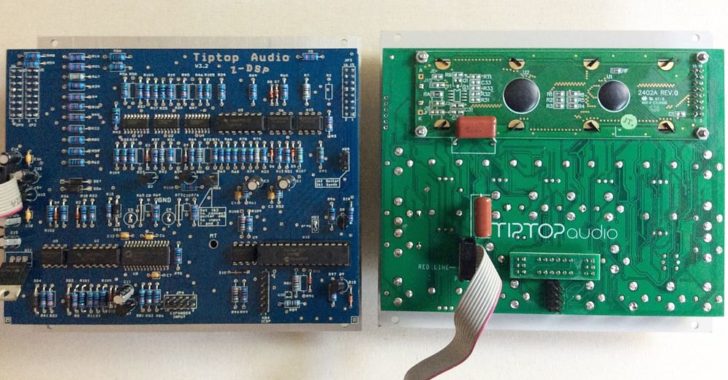
Tiptop Audio today shared this sneak preview of the new version of their Z-DSP Voltage-Controlled Digital Signal Processor.
The previous Z-DSP is being phased out for an updated version that features a new panel and improved analog circuits.

Here’s what they have to say about it:
A side by side comparison of the original (left) and the update (right) highlights the difference in components, size and technology.
Improving upon the original design, users experience: a single printed circuit board, new analog circuits, lower noise, higher headroom, equal power crossfading from dry to wet and added reverse polarity protection—just to name a few changes.
More than a visual update, you have to experience how good it sounds too!
See the Tiptop Audio site for details.

so ugly now….
I actually really like the design, it’s minimal and the color is used meaningfully, unlike most Euro modules.
My thing is that even a gorgeous design like this looks messy in a rack with modules from many vendors. It would be nice if companies would do their custom faceplates but also offer a basic Grayscale version.
Not a problem in the 5u world, now is power. Wish the Euro people could get their act together on this!
There is no HP difference, what size are they referring to?!
Depth
I’m assuming they are referring to the size of the tiny daughter board that is soldered on the back of the main board (that the jacks and front panel are attached to) also the updated version seems to be all surface mount components which are very tiny compared to the through hole components on the previous version. Very cool comparison picture!
The Z-DSP unit is based on the SPIN FV-1 effects chip, which was the last low cost FX processor designed by Keith Barr (who founded Alesis). It’s an $8 chip that is extremely popular in the guitar fx community.
The infuriating thing is that the Z-DSP unit could easily store 64 or even 128 programs in a $1 part, but instead they’ve put tiny flash chips onto cards so they can sell each batch of programs for $65 or $75 each.
I will pass until there is a SD card slot and the programs are offered for free(open source )
– after spending $600 on a unit
i am not going to fork over $60 -$80 per program for something it can already do
also i would love to have ALL my programs on 1 SD card rather than multiple cards
5 cards could cost you more than the unit